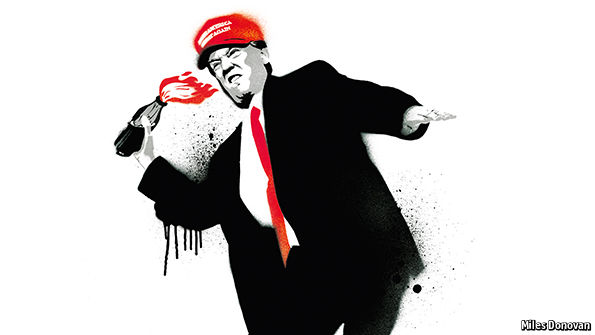LYON, France (AP) — French far-right candidate Marine Le Pen blasted the “two totalitarianisms” of globalization and Islamic fundamentalism Sunday in a speech formally launching her presidential campaign that hit all the right chords for her National Front party followers.
Looking to translate her high early poll numbers into votes, Le Pen evoked a frightening image of France’s future during her much-anticipated speech. The country, enslaved to the European Union and unrecognizable as French, risks losing its identity if the political status quo endures, she said.
“We are at a crossroad …. This election is a choice of civilization,” she said, asking whether her three children and other young citizens would have the rights and cultural signposts of the current generation. “Will they even speak our French language?”
She issued a call for French voters on the left and right to join her, saying “You have a place at our side.”
The speech recalled the thundering and previously unpalatable pronouncements of her father, Jean-Marie Le Pen, the National Front’s hard-liner founder. Marine Le Pen banished him from the party in an effort to clean up its image.
But her remarks made clear the elder Le Pen’s anti-immigration message, targeting Muslims, remains a selling point in party ranks.
“We do not want to live under the rule or threat of Islamic fundamentalism. They are looking to impose on us gender discrimination in public places, full body veils or not, prayer rooms in the workplace, prayers in the streets, huge mosques … or the submission of women,” she said.
The estimated 5,000 people in the amphitheater and watching on big screens cheered and chanted “On est chez nous” (“We are in our land.”)
Le Pen reiterated some of the 144 “commitments” she has pledged to fulfill, if elected. It is a nationalist agenda laying out plans for France to leave the European Union, control its borders and readopt the old French franc as the national currency.
Running under the slogan, “In the Name of the People,” her platform also would create popular referendums on any issue that gathered at least 500,000 signatures. And it would put French people first, with “national preference” enshrined in the Constitution.
“We’ve witnessed the impoverishment of France for some years now at a cultural, economic and social level,” Billy Winkens, a 41-year-old supporter from Toule, in eastern France, said. “Today, people are hungry for change and want to drain the swamp, but in an orderly fashion, with coherence.”
The National Front has taken heart in the French left’s disarray amid the unpopularity of Socialist President Francois Hollande, who decided not to run for re-election.
The right’s leading candidate, Francois Fillon, recently has been caught up in a corruption scandal and created an opening for maverick centrist Emmanuel Macron, who could end up facing Le Pen in the final round of the two-part election.
Le Pen has been a leader in early polls, which place her at the top in the April 23 first-round vote but not winning the May 7 runoff.
If elected, she envisions a “government of national unity” formed after June legislative elections.
Le Pen took control of the National Front in 2011 and largely rid it of the overt anti-Semitism that flourished under her father’s leadership.
Since then, the party has drawn supporters from the length of the political spectrum by tapping into disgust over France’s 10 percent unemployment rate and political corruption scandals. But the portrait its presidential candidate paints is as stark as her prescriptions for change.
The European Union, she said, “is a failure.”
“It hasn’t upheld one of its promises especially in terms of prosperity and security,” Le Pen told the cheering crowd on Sunday.
If elected, she plans to call a referendum on EU membership within six months. She also predicted other European members will join her.
She said the EU is “historical parentheses and, hopefully, one day, just a bad memory.”
Along with leaving the EU, Le Pen would withdraw France from NATO’s integrated command, crack down on illegal immigration and reduce regular immigration to 10,000 people a year.
No one living in France illegally would be issued residency documents or allowed to acquire French citizenship, she said.
She said she would arrange for foreigners convicted of crimes in France to serve their prison terms in their homelands.
“There will be no other laws and values in France but French,” she said.
Britain’s vote to leave the European Union and U.S. President Donald Trump’s election have reveal the “awakening of the people against oligarchies,” Le Pen, praising Trump as a man who respects campaign promises and “acts quickly.”http://time.com/4660732/france-elections-marine-le-pen/





